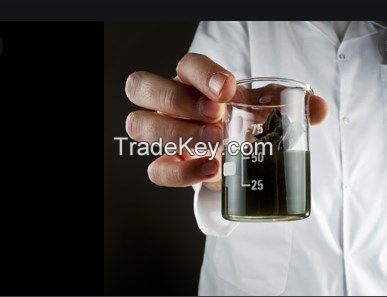


Prix FOB
Obtenir le dernier prix600 ~ 700 USD / Metric Ton ( Negotiable )
|500 Metric Ton Minimum Order
Pays:
Russia
N ° de modèle:
IFO
Prix FOB:
600 ~ 700 USD / Metric Ton ( Negotiable ) Obtenir le dernier prix
Localité:
Russia
Prix de commande minimale:
600 per Metric Ton
Commande minimale:
500 Metric Ton
Packaging Detail:
Bulk tanker
Heure de livraison:
25 days
Capacité de Fournir:
100000 Metric Ton per Month
Payment Type:
Other, T/T
Groupe de produits :
Russia
Personne à contacter Mr. Alexander
Bazhova street, building 8, floor 1 room VI room 8, Moscow, Moscow
Bunker fuel
A sample of residual fuel oil. Small molecules like those in
propane gas, naphtha, gasoline for cars, and jet fuel have
relatively low boiling points, and they are removed at the start of
the fractional distillation process. Heavier petroleum products
like diesel and lubricating oil are much less volatile and distill
out more slowly, while bunker oil is literally the bottom of the
barrel; the only things more dense than bunker fuel are carbon
black feedstock and bituminous residue which is used for paving
roads (asphalt) and sealing roofs.
Bunker fuel is technically any type of fuel oil used aboard ships.
It gets its name from the containers on ships and in ports that it
is stored in; in the days of steam they were coal bunkers but now
they are bunker fuel tanks. The Australian Customs and the
Australian Tax Office define a bunker fuel as the fuel that powers
the engine of a ship or aircraft. Bunker A is No. 2 fuel oil,
bunker B is No. 4 or No. 5 and bunker C is No. 6. Since No. 6 is
the most common, "bunker fuel" is often used as a synonym for No.
6. No. 5 fuel oil is also called navy special fuel oil or just navy
special; No. 5 or 6 are also called furnace fuel oil (FFO); the
high viscosity requires heating, usually by a recirculated low
pressure steam system, before the oil can be pumped from a bunker
tank. In the context of shipping, the labeling of bunkers as
previously described is rarely used in modern practice.
Since the ***0s the International Organization for Standardization
(ISO) has been the accepted standard for marine fuels (bunkers).
The standard is listed under number ***7, with recent updates in
***5 and ***0. They have broken it down to Residual and Distillate
fuels. The most common residual fuels in the shipping industry are
RMG and RMK.[3] The differences between the two are mainly the
density and viscosity, with RMG generally being delivered at **0
centistokes or less, and RMK at **0 centistokes or less.
| Pays: | Russia |
| N ° de modèle: | IFO |
| Prix FOB: | 600 ~ 700 / Metric Ton ( Negotiable ) Obtenir le dernier prix |
| Localité: | Russia |
| Prix de commande minimale: | 600 per Metric Ton |
| Commande minimale: | 500 Metric Ton |
| Packaging Detail: | Bulk tanker |
| Heure de livraison: | 25 days |
| Capacité de Fournir: | 100000 Metric Ton per Month |
| Payment Type: | Other, T/T |
| Groupe de produits : | petroleum |